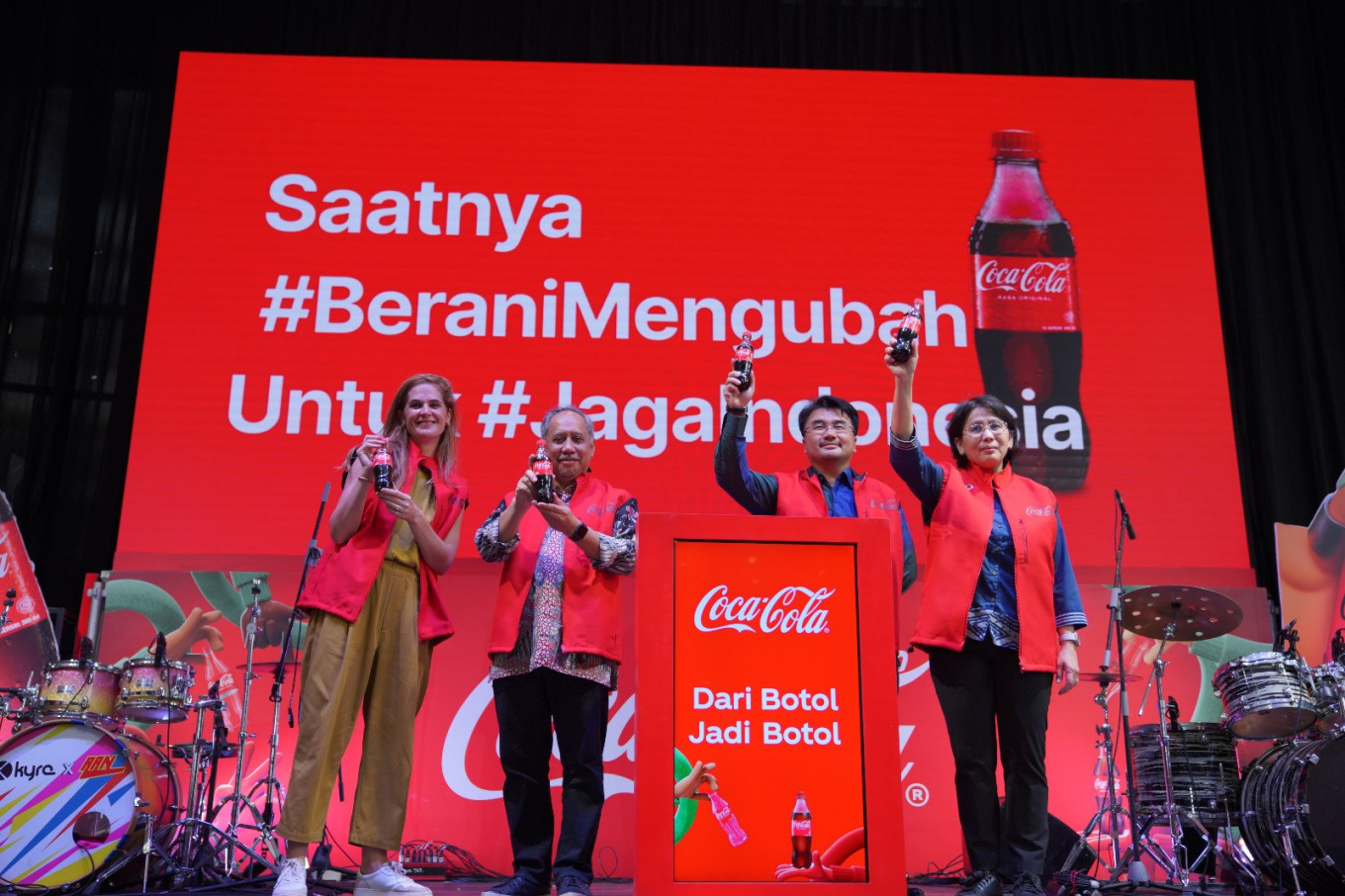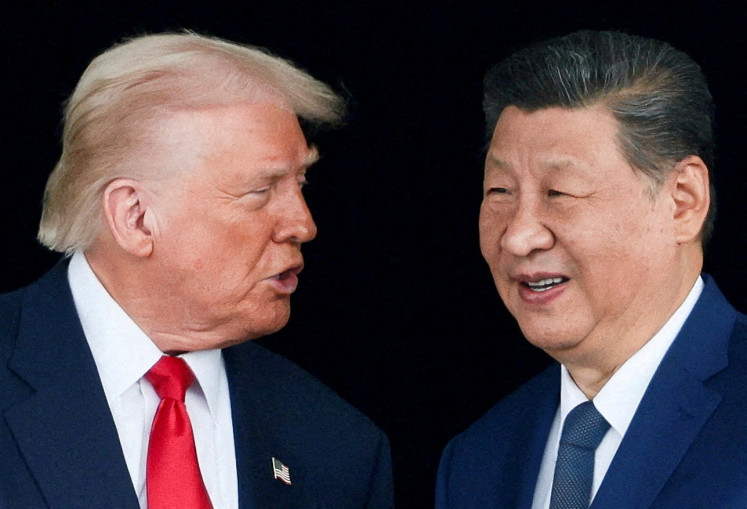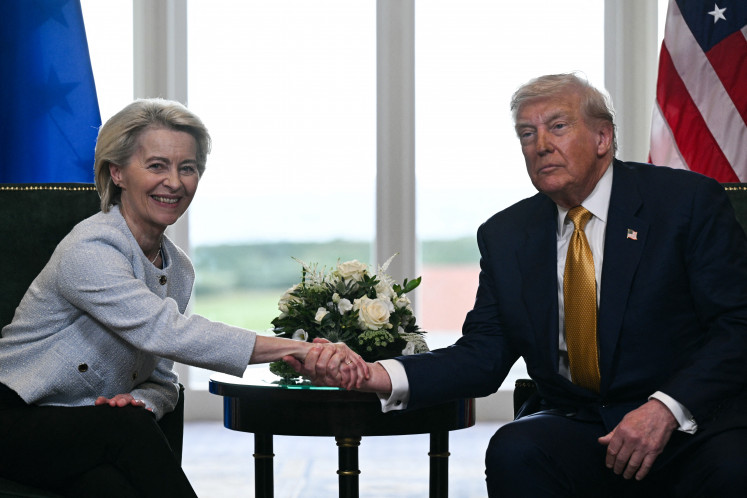Popular Reads
Top Results
Can't find what you're looking for?
View all search resultsPopular Reads
Top Results
Can't find what you're looking for?
View all search resultsCoca-Cola launches 100% rPET bottles in Indonesia to advance World Without Waste campaign
Change text size
Gift Premium Articles
to Anyone
B
eing one of the most populous countries in the world, Indonesia faces a lot of problems with its waste management. The Environment and Forestry Ministry, through the National Waste Management Information System (SIPSN), recorded that the nation’s waste generation has reached 18.99 million tons per year.
Compared to the total volume of waste, Indonesia can’t keep up with the landfills and recycling facilities in the country. In order to provide a solution and alleviate some of the problems, the government has tasked individuals, as well as companies, to reduce waste. One company that has stood out based on their pillars of sustainability and waste management is Coca-Cola in Indonesia.
Over the weekend, the company launched their new packaging, which are made from 100 percent recycled PET plastic (rPET), excluding caps and labels – a first for the company's beverage products in Indonesia, in line with their World Without Waste vision. At the center of the celebration is Amandina Bumi Nusantara, a recycling plant with capacity of 25,000 tons of PET per year that established by bottling partner Coca-Cola Europacific Partners Indonesia with Dynapack Asia located in West Java.
The Closed-Loop Concept
“If you look at plastic, it is a material that can be recycled. But I think the question is, how it’s being collected and recycled, what is it turning into. In the past, it went into different products such as: clothing, textile, but now it’s becoming another bottles which is what you call an close-loop.” Triyono Prijosoesilo, Director of Public Affairs, Communications and Sustainability, PT Coca-Cola Indonesia explained. He added, “The closed-loop bottle is a bottle, bringing that bottle to become another one. It’s a fully circular model, and really a fully second life for that model itself. That’s why we have the ‘Dari Botol Jadi Botol’ slogan.”
The rPET bottles produced at Amandina have undergone a series of safety tests and have been declared compliant with Indonesia’s regulatory standards set by BPOM, as well as The Coca-Cola Company’s strict global standards.
As previously noted, the packaging for Coca-Cola Original, Coca-Cola Zero Sugar, Fanta, and Sprite in 390ml bottles, in addition to Sprite Waterlymon in 425ml bottles, comprises entirely 100% rPET material, with the exception of the cap and label. This closed-loop approach supports Coca-Cola's World Without Waste objective, which aims for a minimum of 50 percent recycled plastic used in packaging and strives to collect the equivalent of every can and bottle sold by the year 2030.
With the introduction of bottles made from the new 100 percent rPET, Coca-Cola systems is making a major contribution to this goal in Indonesia by reducing dependence on new plastics and lowering carbon emissions in the production process. Aside from Indonesia, the use of 100% rPET has been implemented by The Coca-Cola Company in more than 40 countries around the world.
Fortunately, Triyono said that there is an increase in the demand for recycled plastics. With the demand also comes investment from other countries. Currently, Indonesia has changed its position from importer to exporter. To accelerate the implementation of a closed-loop business model in the country, Triyono emphasized the importance of all stakeholders recognizing the advantages this model offers.
Collaborative Empowerment
“As a company, of course we do have that vision of World Without Waste, we want to be part of the solution, but we also believe that being part of the solution, we have to work with a lot of stakeholders,” said Triyono, crediting with the government’s initiative to help build an awareness to people in the country.
A big part of Coca-Cola system collaborative efforts is also attributed to their partnerships with ‘recycling heroes,’ a nickname they use for sanitation workers or waste management workers. Along with Dynapack Asia, Coca-Cola Europacific Partners founded Mahija Parahita Nusantara Foundation with the sole goal to ensure a reliable and ethical management system in their recycling facilities, as well as improving the quality of life for sanitation workers.
“So they help–not only purchasing the materials, but also supporting them in terms of life insurance–getting them a doctor's visit, and providing free education for the children. Support in terms of basic necessities, but also provide the guarantee of market because it’s critical for them to have that guarantee of market, because they’re basically living in a very fragile situation. They don’t have the luxury of thinking too far ahead. So having that certainty of the market, is actually providing them with a peace of mind,” said Lucia Karina, VP Public Affairs, Communications, and Sustainability of Coca-Cola Europacific Partners Indonesia & Papua New Guinea.
Coca-Cola Europacific Partners Indonesia, in collaboration with the Mahija Parahita Nusantara Foundation, recently launched a partnership with Sekolah Kami in Bekasi to offer free education for families of workers at the nearby Amandina Bumi Nusantara facility. The company is eager to broaden their pilot project to other regions, given that there are currently 24 collection centers throughout Indonesia.
Changing the Mindset
While recycling heroes play a big part of the sustainability goals set forth by the company, changing the mindset of their consumers and the whole Indonesia also plays a part in achieving the World Without Waste initiative.
Coca-Cola Indonesia held a two-days event in Gandaria City Mall to launch their new 100% rPET bottles on June 16 and 17, and filled the schedules with impactful talk shows and concerts.
By bringing three bottles to the event, attendees are allowed to enter the piazza and check out various informative sustainability talk show focusing on circular economy, featuring industry and community experts, as well as visit the 360° video featuring a "Bottle to Bottle" journey in an immersive room. The latter is a room where consumers can visually understand how each bottle can be recycled as a newer bottle, with safety guidelines that are implemented by the government. Moreover, by bringing 10 bottles, attendees are able to stay to watch an exclusive concert by RAN on the first day, and Padi Reborn on the second day.
“Over the past two days, we have been launching our 100% rPET bottles. To engage with our consumers in a fun and meaningful way, we have organized a music concert as part of the launch. To attend, people must bring empty bottles, which will serve as their tickets for entry. This approach emphasizes the value of these used bottles and demonstrates how they can be transformed into something purposeful. Through this enjoyable event, consumers can both have a great time and contribute positively to the environment,” according to Triyono.
Asked about what he wanted attendees to know after the event, Triyono hoped that the people can leave with a change of mindset, viewing plastic not as waste but as a valuable resource that can be repurposed within the value chain. Moving forward, he hoped that there will be an awareness to try to save that resource, by the way of a simple act of segregating plastic from other waste.
“If the packaging is made of plastic, it’s better to segregate so that it doesn’t directly go to a waste bin and mixed with other waste. It can be directed to recycling or collection centers too. I think that’s what I would hope that consumers would be able to take from all of this that we are doing. We are launching our bottle rPET as a proving point, but we’re also engaging them to become ambassadors, to become an active participant,” he concluded.










